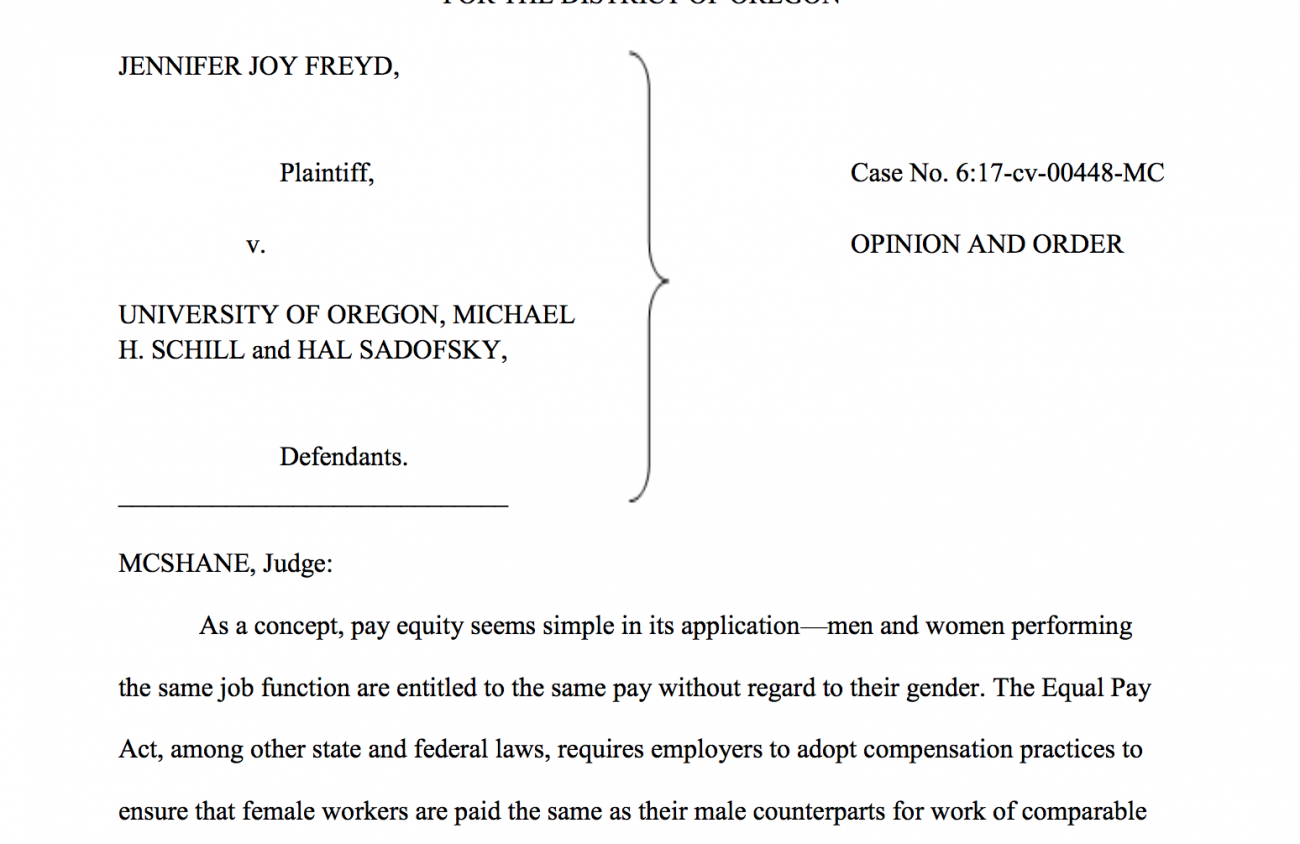A well-respected University of Oregon psychology professor’s equal pay case was dismissed May 2 in response to a motion to dismiss filed by the UO.
According to court documents, Prof. Jennifer Freyd was concerned that her salary was less than male professors with less seniority in the UO Department of Psychology. She “requested a raise to bring her salary in line with her expected salary, predicted as a function of seniority.”
Freyd is a tenured full professor in the Department of Psychology, which is in the College of Arts and Sciences.
The UO decided not to give Freyd a raise “after concluding that Professor Freyd was compensated at a higher rate than the majority of professors in the College of Arts and Sciences and that any discrepancy between Professor Freyd’s salary and her male colleagues was attributable to retention raises (which Professor Freyd never sought) and significant differences in job duties.”
Freyd then filed the lawsuit.
Economics professor Bill Harbaugh of UO Matters blog has been following the case, and he pointed out back in April that, according to the university’s argument, “there can be no such thing as pay discrimination for professors because there are no two professors with the same job classification.”
Harbaugh writes, “If I understand it, they are arguing that there is no such job as professor. Instead, there are different professor jobs, each with different responsibilities. So different that every professor should really be in their own separate, unique, incomparable job classification.”
In his ruling, U.S. District Court Judge Michael McShane writes, “Even when viewed in the light most favorable to Professor Freyd, the evidence establishes that her four male colleagues perform significantly different work than that done by Professor Freyd.”
The work is not simply teaching, McShane continues, and the work and its value varies from professor to professor.
So, he writes, “Because Professor Freyd cannot establish that she performs substantially similar work in the unique setting of a university to that of her comparators, her claims fail.”
The Equal Pay Act “requires that men and women be given equal pay for equal work in the same establishment.”
McShane also addresses retention raises — a strategy common in academia in which a professor applies for jobs elsewhere to elicit a better counter-offer from the university at which she already teaches.
Freyd alleges that the UO’s practice of awarding retention raises causes a disparate impact on female professors in the Department of Psychology. During her case, she said there was a salary gap of at least $15,000 and as much as $25,000 between male and female full professors, the result of the UO’s practice of offering retention raises, according to court documents.
According to the court document, Freyd offered evidence that the UO has “offered retention raises sufficient to keep female professors who have outside offers 40% of the time, while they have offered sufficient raises to keep male professors with outside offers 62% of the time, which indicates that the University retained women at a rate of only 65% of the rate that they retained men.”
McShane ruled that the sample size of 21 men and five women was too small writing that the “data reflects such a small sample size as to render the statistical significance of Professor Freyd’s analysis suspect.”
Harbaugh writes of the argument about professors doing different work: “It seems to me that an opinion from the judge agreeing that this argument is grounds for dismissing the case, if sustained, would be a precedent with wide-ranging effects, making it nearly impossible for anyone in a professional job with varying job responsibilities to ever win a pay discrimination case.”
When asked for comment on the case, Zack Barnett with UO’s Communications issued a statement saying, “We’re grateful to Judge McShane for granting the UO’s motion to dismiss the case on summary judgement. His decision speaks for itself. Professor Jennifer Freyd is a respected and valued member of the University of Oregon faculty and a national leader in her field of study, and we believe this decision establishes that she is fairly compensated relative to her peers.”
On May 3, the day after the ruling, Freyd’s department head, Ulrich Mayr, sent an email to his colleagues in which he points out that Freyd started the field of study on institutional betrayal, He then goes on to say that he personally believed before the lawsuit “that given the pay structure among full professors in our department, Jennifer deserves a higher salary,” and that work needs to be done toward pay equity in the department.”
Mayr concludes, that the lawsuit “has no bearing on the broader question whether there are factors in society, academia and our institution that lead to gender inequities in pay, or access to other important resources. Thus, these outcomes cannot be an excuse for reducing our efforts towards identifying and counteracting such factors.”
Freyd’s case can be appealed to the Ninth Circuit.
Full disclosure: Attorney Jennifer Middleton who argued the case is with law firm Johnson Johnson Lucas & Middleton, the law firm one of EW’s owners, Art Johnson, retired from.
